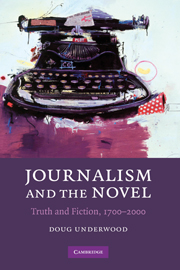Book contents
- Frontmatter
- Contents
- Acknowledgements
- Introduction
- Chapter 1 Journalism and the rise of the novel, 1700–1875: Daniel Defoe to George Eliot
- Chapter 2 Literary realism and the fictions of the industrialized press, 1850–1915: Mark Twain to Theodore Dreiser
- Chapter 3 Reporters as novelists and the making of contemporary journalistic fiction, 1890–today: Rudyard Kipling to Joan Didion
- Chapter 4 The taint of journalistic literature and the stigma of the ink-stained wretch: Joel Chandler Harris to Dorothy Parker and beyond
- Epilogue: The future of journalistic fiction and the legacy of the journalist-literary figures: Henry James to Tom Wolfe
- Appendix: The major journalist-literary figures: their writings and positions in journalism
- Notes
- Index
Epilogue: The future of journalistic fiction and the legacy of the journalist-literary figures: Henry James to Tom Wolfe
Published online by Cambridge University Press: 09 July 2009
- Frontmatter
- Contents
- Acknowledgements
- Introduction
- Chapter 1 Journalism and the rise of the novel, 1700–1875: Daniel Defoe to George Eliot
- Chapter 2 Literary realism and the fictions of the industrialized press, 1850–1915: Mark Twain to Theodore Dreiser
- Chapter 3 Reporters as novelists and the making of contemporary journalistic fiction, 1890–today: Rudyard Kipling to Joan Didion
- Chapter 4 The taint of journalistic literature and the stigma of the ink-stained wretch: Joel Chandler Harris to Dorothy Parker and beyond
- Epilogue: The future of journalistic fiction and the legacy of the journalist-literary figures: Henry James to Tom Wolfe
- Appendix: The major journalist-literary figures: their writings and positions in journalism
- Notes
- Index
Summary
No art that is not understood by the people can live or ever did live a single generation.
– Frank NorrisOur American professors like their literature clear and cold and pure and very dead.
– Sinclair LewisIt is so hard to be clear. Only a fool is willfully obscure.
– John SteinbeckThe press … is the watchdog of civilization, and the watchdog happens to be … in a chronic state of rabies.
– Henry JamesIn both his time and ours, the stylistically complex novelist Henry James has served as the literary intellectual's bulwark against the crudities and the lowbrow nature of popular culture and the popular press that James came to loathe. James' views about the press were reflected in his recondite literary philosophy and his opaque writing strategies. But they also grew out of personal experience.
In 1875, the youthful James had arranged to be a correspondent on manners, people, and the arts for the New York Tribune during his travels to Europe. But his editor, Whitelaw Reid, didn't like the lengthy and discursive style of James' “letters” and wrote to him that they should be more “newsy” and written less on “topics too remote from popular interests to please more than a select few of our readers.” An offended James ended the relationship, writing back: “I am afraid I can't assent to your proposal … I know the sort of letter you mean – it is doubtless the proper sort of thing for the Tribune to have … I am too finical a writer and I should be constantly becoming more ‘literary’ than is desirable.”
- Type
- Chapter
- Information
- Journalism and the NovelTruth and Fiction, 1700–2000, pp. 184 - 198Publisher: Cambridge University PressPrint publication year: 2008



